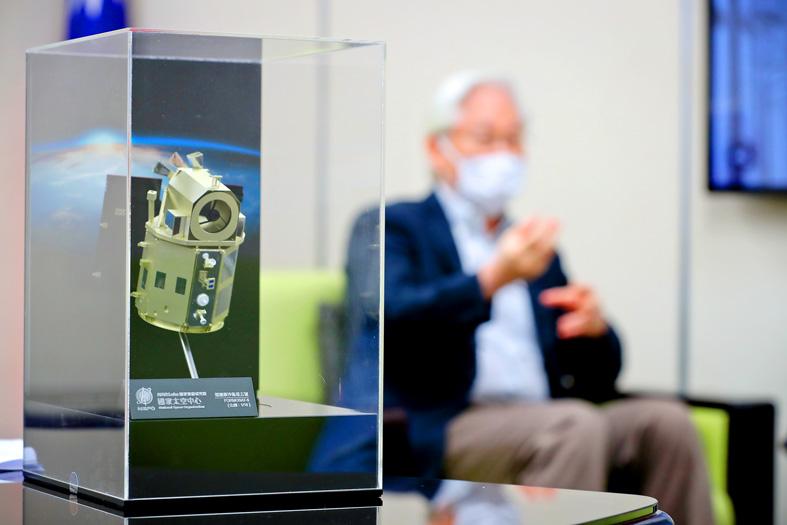Taiwan is stepping up its efforts to tap into the global aerospace market, with a focus on developing a specific kind of satellite, Minister of Science and Technology Wu Tsung-tsong (吳政忠) said on July 6.
The development of low Earth orbit (LEO) satellites are particularly worth pursuing for Taiwan, Wu said in an interview with the Central News Agency, referring to orbits with a maximum altitude of 2,000km.
“It is an opportunity Taiwan definitely cannot afford to miss,” Wu said.

Photo: CNA
Such satellites, which are often deployed in constellations, have a relatively short life cycle of two to four years compared with larger ones and therefore offer more of an opportunity for Taiwanese businesses, he said.
LEO satellites are crucial to the development of the Internet of Things (IoT), which has been pursued by global technology and communications heavyweights such as SpaceX, Amazon and OneWeb, he said.
LEO communications satellites, which are relatively inexpensive, can be launched in large enough numbers to economically provide sufficient bandwidth for data transmission rates that IoT applications require, he said.
This means that there is a high-demand sector that no longer relies on highly advanced technology only affordable to superpowers, Wu said, adding that the sector has a relatively low market threshold that countries like Taiwan can explore.
Taiwan hopes to one day manufacture its own LEO satellites, he said.
The government this year launched a four-year, NT$4 billion (US$142.83 million) project with the aim of launching its first LEO communications satellite in 2025.
In the meantime, Taiwan can capitalize on its years of experience as an original equipment manufacturer to become part of the LEO satellite supply chain, National Space Organization Acting Director-General Yu Shiann-jeng (余憲政) said.
About a dozen Taiwanese companies — including Microelectronics Technology Inc, Win Semiconductors and Kinpo Electronics — are providing components and ground-based reception equipment for SpaceX, Yu said.
With maturer technology and more experience, Taiwanese firms could extend their reach to provide more comprehensive modules with greater added value, he said.
Also expected to help is the Space Development Promotion Act (太空發展法), which was promulgated at the end of May.
The act, which regulates the nation’s space-based activities, shows the world Taiwan’s ambition to carve out its own niche in the space economy, Wu said.
It covers four areas — setting principles of development that are aligned with international space laws, regulating space-based activities to ensure safety, establishing rocket launch sites and promoting industrial development, Wu said.
The ministry is designated as the regulator of the sector and will establish a dedicated agency to deal with related affairs, he said.

The Grand Hotel Taipei on Saturday confirmed that its information system had been illegally accessed and expressed its deepest apologies for the concern it has caused its customers, adding that the issue is being investigated by the Ministry of Justice Investigation Bureau. The hotel said that on Tuesday last week, it had discovered an external illegal intrusion into its information system. An initial digital forensic investigation confirmed that parts of the system had been accessed, it said, adding that the possibility that some customer data were stolen and leaked could not be ruled out. The actual scope and content of the affected data

‘LIKE-MINDED PARTNER’: Tako van Popta said it would be inappropriate to delay signing the deal with Taiwan because of China, adding he would promote the issue Canadian senators have stressed Taiwan’s importance for international trade and expressed enthusiasm for ensuring the Taiwan-Canada trade cooperation framework agreement is implemented this year. Representative to Canada Harry Tseng (曾厚仁) in an interview with the Central News Agency (CNA) said he was increasingly uneasy about Ottawa’s delays in signing the agreement, especially as Ottawa has warmed toward Beijing. There are “no negotiations left. Not only [is it] initialed, we have three versions of the text ready: English, French and Mandarin,” Tseng said. “That tells you how close we are to the final signature.” Tseng said that he hoped Canadian Prime Minister Mark Carney

President William Lai (賴清德) yesterday bestowed one of Taiwan’s highest honors on Saint Vincent and the Grenadines (SVG) Ambassador Andrea Clare Bowman in recognition of her contributions to bilateral ties. “By conferring the Order of Brilliant Star with Grand Cordon on Ambassador Bowman today, I want to sincerely thank her, on behalf of the Taiwanese people, for her outstanding contribution to deepening diplomatic ties between Taiwan and SVG,” Lai said at a ceremony held at the Presidential Office in Taipei. He noted that Bowman became SVG’s first ambassador to Taiwan in 2019 and

A man walks past elementary school artworks at the Taipei Lantern Festival in Ximen District yesterday, the first day of the event. The festival is to run from 5pm to 10pm through March 15.